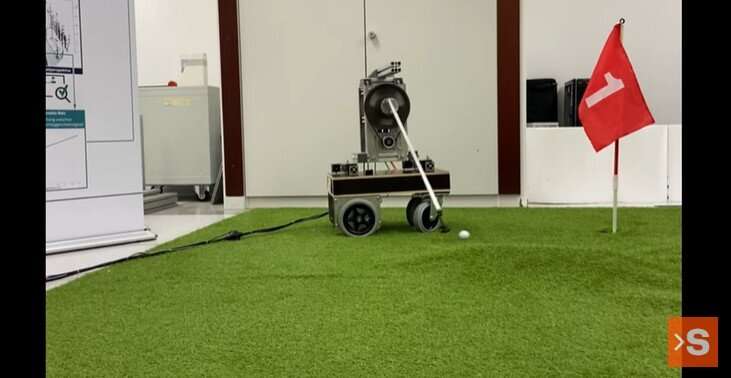Golfing robot uses physics-based model to train its AI system

Researchers at Paderborn University in Germany have built a robot that can knock a ball into a hole using a club on a putting green on most attempts. Annika Junker, Niklas Fittkau, Julia Timmermann and Ansgar Trächtler have published a paper on the arXiv preprint server describing their robot and its performance.
Golf is a notoriously difficult sport—professionals and amateurs alike spend countless hours attempting to improve their game. One of the most difficult parts of the game is putting the ball into the hole. Much of the difficulty lies in the combination of factors at play—the height of the grass and its roughness, the amount of wind and degree of humidity, and worst of all, the terrain. Golf greens are not flat like practice mats on office floors; they have small hills and valleys that play havoc with the speed of the ball. In this new effort, the researchers built a robot to tackle the problem of putting on a lab-based putting green.
Most AI systems learn by studying the work of others, typically humans, looking for patterns in thousands of data samples that lead to desired outcomes. With golf, this approach is impractical because the results would only apply to one shot on one green. For a robot to golf on a variety of greens, it must be able to learn on the fly.
To build such a system, the researchers used a physics-based model that accepted factors such as ball speed and weight, and the ball response to changes in terrain, such as hills. The model also factored in the impact of wind. The researchers placed a 3D camera above their lab-based green and took a snapshot of it, capturing all of its wavy nuances. That snapshot was then sent to the physics model that ran thousands of virtual attempts to knock the virtual ball into the virtual hole using a virtual club—all based on the current spot of the ball.
Once satisfied it had worked out the correct approach, the system sent instructions to the robot, telling it where to place itself, and then how much speed to use when striking the ball. Testing showed the robot able to hit the ball into the hole approximately 60 to 70% of the time under ideal conditions.
Annika Junker et al, Autonomous Golf Putting with Data-Driven and Physics-Based Methods, arXiv (2022). DOI: 10.48550/arxiv.2211.08081
IEEE Spectrum: spectrum.ieee.org/golf-robot-putts-like-pro
© 2022 Science X Network
Citation:
Golfing robot uses physics-based model to train its AI system (2022, November 28)
retrieved 28 November 2022
from https://techxplore.com/news/2022-11-golfing-robot-physics-based-ai.html
This document is subject to copyright. Apart from any fair dealing for the purpose of private study or research, no
part may be reproduced without the written permission. The content is provided for information purposes only.
For all the latest Technology News Click Here
For the latest news and updates, follow us on Google News.
